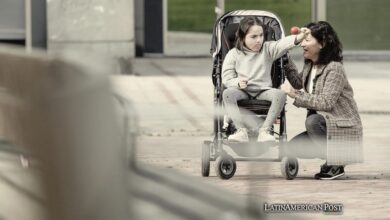Tips for Caring for a Person with Alzheimer’s at Home
Accompanying a family member with this disease at home responsibly and with love is possible. Follow these tips for caring for a person with Alzheimer's at home.

Every September 21, World Alzheimer’s Day is celebrated, a date that aims to create awareness about a disease that more and more people suffer, its risks and the reduction of the possibility of presenting it. Photo: Pexels
LatinAmerican Post | Vanesa López Romero
Listen to this article
Leer en español: Tips para cuidar a una persona con alzheimer en casa
Every September 21st, World Alzheimer's Day is celebrated, a date that aims to create awareness about a disease that more and more people suffer, its risks and the reduction of the possibility of having it. This celebration is organized by the World Health Organization (WHO), which organize information sessions throughout the month of September. This year the organization has emphasized the importance of an early diagnosis, since Alzheimer's represents 70% of dementia cases in the elderly. A diagnosis that is made on time can not only make life and processes easier for people with the disease, but also for those close to them, since this disease has a direct consequence on the people around those who suffer from it.
On this occasion, we bring you some advices from Daniela Sierra, a psychologist at the Pontificia Universidad Javeriana in Colombia who has focused her career on working with people with Alzheimer's and their families in the diagnosis and initial phase of the disease.
Learn to understand from love and patience
For Sierra, the first thing to keep in mind is the importance of strengthening the bond with the person with Alzheimer's and doing it with love and patience. This will allow honest support to be given when dealing with the patient, understanding that this person now perceives the world in a different way. "Alzheimer's is a neurodegenerative disease, which means that as soon as it begins, some neurons in the cerebral cortex gradually begin to die. This process can normally last between 10 and 15 years. It is long and, of course, exhausting. Learn to understand that it cannot be fully controlled and that, like the disease, management is also gradual, it will help to better understand and take care of the patient ", says the expert.
Getting informed is the key
Likewise, learning about the disease and maintaining a constant conversation with the doctor treating the patient is one of the points where Sierra highlights the most. "Knowing the process from other cases can prepare the family member to know what the possibilities are from the diagnosis onwards. But more importantly, knowing other cases can give hope, can make the person or family members feel less alone", says the psychologist.
Read also: Answers to Common Questions About COVID-19 Vaccines
Asking specific questions as obvious as they may seem to the patient's physician can be of great help. For Sierra, " no question is obvious . This disease is difficult to carry, being able to go to an expert should be a possibility not only for the patient, but also for the family. We are in the task of supporting and accompanying even the family to have a less complicated process. "
Create new routines
Alzheimer's patients do not become people who can not do anything. Creating new routines, giving them new tasks and opening new spaces for rapprochement is vital for living with a person who suffers from the disease. Sierra recommends giving him specific household chores that the patient has shown interest in. Cooking, for example, being a manual activity, can generate a feeling of well-being in the patient. Likewise, it recommends to keep a relationship with the children, as the links continue to exist and may continue to grow. "It is about allowing those spaces. Creating routines of board games, walks outside or reading of children towards the patient can generate that the bond grows even more", explains the expert.
For Sierra, the most important thing is to always be patient and communicate. "Accompanying is not something that should be done alone. Doing it as a family is good because one does not feel alone, one feels accompanied and supported by people who understand first-hand what one may be feeling. You also have to always keep in mind that the the patient is still a person, a human being with feelings, only now he sees life in a different way. Accompanying from understanding will always be the best, " she says.




